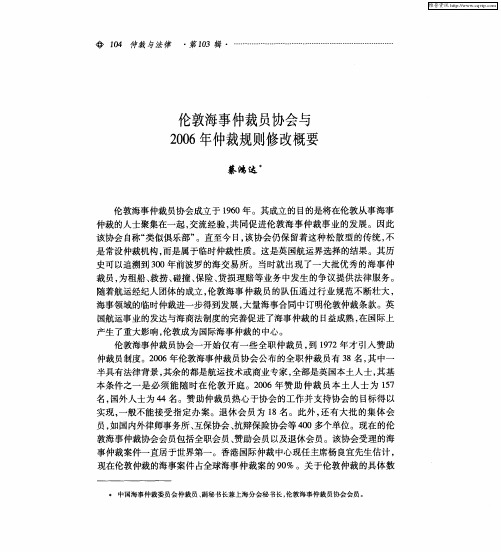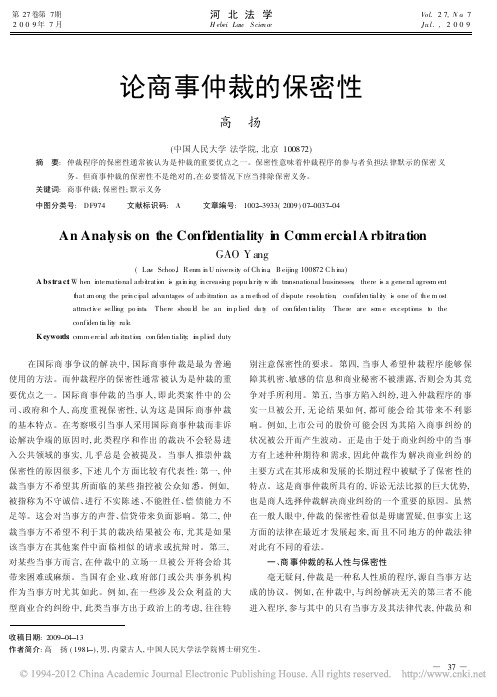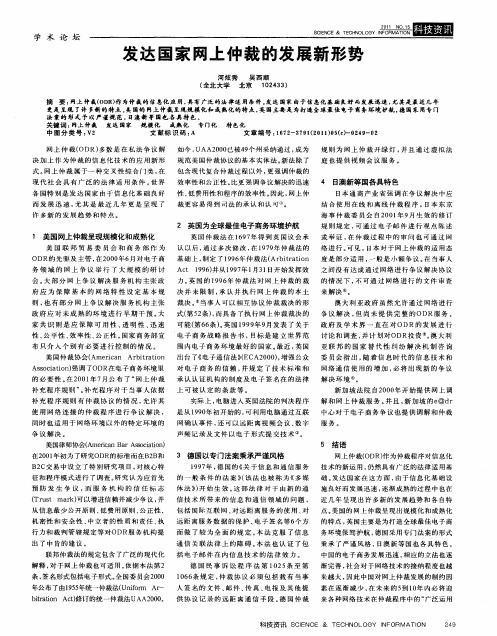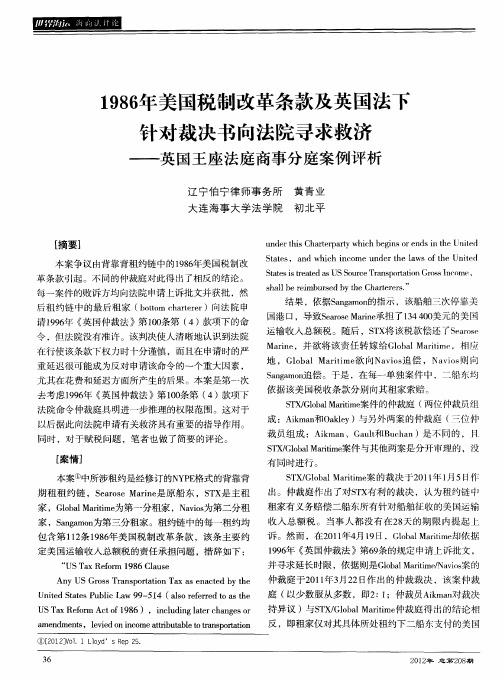英国仲裁法
- 格式:docx
- 大小:32.73 KB
- 文档页数:28





英国证券集体诉讼制度的内容全文共四篇示例,供读者参考第一篇示例:英国证券集体诉讼制度是指在证券市场上,当一家公司或者金融机构因发布虚假信息或违反证券法规造成股价波动或投资者损失时,投资者可以联合起诉该公司或机构进行权益维护的一种制度。
英国作为最早引进证券集体诉讼制度的国家之一,其法律体系和司法实践已经形成了相对完善的机制,为投资者提供了更好的法律保障和维权途径。
英国证券集体诉讼制度的法律依据主要包括《金融服务和市场法》(Financial Services and Markets Act,简称FSMA)和《民事程序法》(Civil Procedure Rules,简称CPR)。
根据这些法律规定,投资者可以以代表机构或个人的方式提起诉讼,通过诉讼程序来维护自己的权益。
这种制度的重要性在于可以平等对待所有受影响的投资者,使他们能够团结起来共同参与诉讼,一起寻求赔偿或补偿。
英国证券集体诉讼制度的优势在于能够提高投资者的维权效率和降低维权成本。
相比个体投资者单独起诉的情况,集体诉讼可以减少重复劳动和费用支出,提高诉讼效率,使诉讼更加合理、公正和便捷。
集体诉讼还可以减少对被告方的打击,避免诉讼拖延和资源浪费,为双方提供更好的解决方案和协商空间。
在实践中,英国证券集体诉讼制度为投资者提供了一种有效的救济途径。
在某家公司发布虚假信息导致股价暴跌后,受损投资者可以通过集体诉讼的方式向法院提起诉讼,要求公司补偿损失。
这种维权方式能够有效地保护投资者的权益,维护证券市场的公平和透明。
英国证券集体诉讼制度也存在一些挑战和问题。
诉讼程序需要耗费大量的时间和精力,往往需要经过漫长的审理过程才能获得结果。
诉讼费用和律师费用较高,对于一些普通投资者而言可能承担不起。
被告方通常具有较强的资金和法律实力,很难在诉讼过程中取得胜诉。
为了解决这些问题,英国政府和司法机构近年来一直在不断完善证券集体诉讼制度。
他们致力于简化诉讼程序,降低维权成本,提高诉讼效率,为投资者提供更好的法律保护和支持。

国际仲裁与国内仲裁的⼏个重⼤区别近年来,国际仲裁可谓⽅兴未艾。
随着中国市场的进⼀步开放和中国企业“⾛出去”的步伐加快,国际仲裁作为最主要的跨境争议解决机制,已经成为了中国企业的必修课。
以国际货物买卖领域为例,今天⼏乎已经很难见到⼀个没有仲裁条款的买卖合同了。
但是,国际仲裁⾮常复杂,实践中已经演变成为⼀个混合了⼤陆法系和英美法系诸多原素的综合体,值得中国的法律从业者们认真学习。
本⽂作者结合⾃⼰的⼯作经历,尝试总结国际仲裁与国内仲裁之间的⼏个重⼤区别,希望对读者有所帮助。
⼀、成本控制在中国,由于仲裁只能以机构仲裁的形式进⾏,⽽各个仲裁委员会采取的都是按争议⾦额的⼀定⽐例收取仲裁费的收费模式,加上国内律师习惯采取前期固定费⽤加胜诉后奖励费⽤的收费模式,所以在国内仲裁中,仲裁的成本是基本可预期的。
对当事⼈来说,仲裁费加律师费,再加上可能发⽣的鉴定费⽤和专家证⼈花销等,就基本上构成了全部的仲裁成本。
但是在国际仲裁中,情况可能完全不同。
⾸先,相当多的国际仲裁是以临时仲裁的形式进⾏的,此时仲裁员⼀般以案件花费时间乘以其报价费率来确定收费,⽽即使是在机构仲裁的情况下,以LCIA为代表的仲裁机构也是采取计时收费模式。
其次,在英国,由于法律禁⽌奖励收费,律师们只能采取按⼩时计费的收费⽅式。
以上情况可能导致在⼀个国际仲裁中,最后的费⽤完全取决于案件的复杂程度⽽与争议⾦额的⼤⼩没有关系,甚⾄会出现仲裁费⽤⾼过争议⾦额的情况。
⼆、法律适⽤在国内仲裁中,不存在法律适⽤的问题。
但是在国际仲裁中,⾄少存在5种不同的法律制度可能与之相关:1. 适⽤于当事⼈签订仲裁协议的能⼒的法律;2. 适⽤于仲裁协议及仲裁协议履⾏的法律;3. 适⽤于仲裁庭的存在及其所进⾏的仲裁程序的法律,也就是我们常说的仲裁法;4. 适⽤于实体争议问题的法律,也就是我们常说的准据法;5. 适⽤于裁决的承认与执⾏的法律。
准据法⼀般是当事⼈最为重视的,因为它会直接决定权利、义务、过错、违约、赔偿等实体问题。
审理撤销仲裁裁决案件若干法律问题来源:未知作者:j 日期:10-06-24根据我国《仲裁法》第五章的规定,当事人可向法院申请撤销仲裁裁决,法院应依法作出是否撤销仲裁裁决的裁定。
但是,对于如何审理此类案件,法律并没有作出明确规定,因此,在司法实践,容易引起理解差异,导致适用困难,本文尝试对申请期限、审理程序、当事人地位、仲裁协议效力、重新仲裁以及受理费等有关问题进行阐述,并提出个人观点。
全文约9500字。
撤销仲裁裁决[1]是指对于符合法律规定情况的仲裁裁决,经由当事人提出申请,人民法院依法组成合议庭审查核实,裁定是否撤销仲裁裁决的司法监督制度,是法院行使司法监督权的重要表现形式之一,也是各国通行的司法控制仲裁的一种表现。
虽然《中华人民共和国仲裁法》(以下简称《仲裁法》)对申请撤销仲裁裁决案件的审理作出了规定[2],但是这些规定都过于原则、概括,缺乏必要的操作性条款,因此,无论是学术界还是司法实务界,都存在一定的争论和模糊认识,容易引起理解差异和适用困难,司法实践中,各地法院的做法迥异,在一定程度上也影响了司法的严肃性和统一性。
有鉴于此,笔者试图就审理撤销仲裁裁决案件所遇到的有关问题,提出自己的粗浅看法,以求教大方。
一、申请撤销仲裁裁决的期限尽管《仲裁法》第五十九条已经对申请撤销仲裁裁决的期限做出了明确规定,即当事人申请撤销仲裁裁决,应当自收到仲裁裁决书之日起6个月内提出,但是,这个期限及我国《民事诉讼法》规定的裁决承认及执行的期限相比较而言,显然有点过长。
根据《民事诉讼法》第二百一十九条的规定,胜诉方申请执行的期限也是6个月,这样就使“一裁终局”的仲裁裁决长期处于不确定的状态,不利于维护当事人的合法权益。
从世界范围看,很多国家法律规定的提起撤销仲裁裁决程序的期限不超过3个月,而申请执行的期限却明显要长得多。
例如:1996年《英国仲裁法》第70条规定,申请撤销的期限为裁决作出之日起28天内,而当事人申请承认及执行裁决的期限是6年;法国《民事诉讼法典》第1505 条规定的期限为通知裁决及其执行许可后的1个月内;《比利时司法法典》第1707 条规定的申请期为裁决通知之日起3个月内;《荷兰仲裁法》第1064条规定撤销申请可在裁决一旦具有既判力时3个月内提出,超过此期限申请权即告取消;美国《联邦仲裁法》第12条规定,撤销裁决的期限为仲裁裁决提交或者送达后3个月内,而对于承认及执行裁决的期限长达3年。
英国仲裁法[Arbitration Act 1996][Arbitration Act 1996]Arbitration Act 1996 (of England) 1996 CHAPTER 23 [17th June 1996]Lex MercatoriaArbitration Her Majesty's Stationary OfficeLM A-ZLM toc LM 19**Arbitration Act 1996 (of England)1996 CHAPTER 23 [17th June 1996]{ 1 }PART I - ARBITRATION PURSUANT TO AN ARBITRATION AGREEMENT{ 4 } Introductory{ 5 }Section 1. - General principles.{ 6 }Section 2. - Scope of application of provisions.{ 11 }Section 3. - The seat of the arbitration.{ 24 }Section 4. - Mandatory and non-mandatory provisions.{ 30 }Section 5. - Agreements to be in writing.{ 36 }Definition of arbitration agreement.{ 46 }Section 6. - The arbitration agreement{ 47 }Section 7. - Separability of arbitration agreement.{ 50 }Section 8. - Whether agreement discharged by death of a party.{ 52 }Stay of legal proceedings.{ 55 }Section 9. - Stay of legal proceedings{ 56 }Section 10. - Reference of interpleader issue to arbitration.{ 62 }Section 11. - Retention of security where Admiralty proceedings stayed.{ 65 } Commencement of arbitral proceedings{ 70 }Section 12. - Power of court to extend time for beginning arbitral proceedings, &c.{ 71 } Section 13. - Application of Limitation Acts.{ 83 }Section 14. - Commencement of arbitral proceedings.{ 97 }The arbitral tribunal{ 103 }Section 15. - The arbitral tribunal.{ 104 }Section 16. - Procedure for appointment of arbitrators.{ 108 }Section 17. - Power in case of default to appoint sole arbitrator.{ 120 }Section 18. - Failure of appointment procedure.{ 128 }Section 19. - Court to have regard to agreed qualifications.{ 138 }Section 20. - Chairman.{ 140 }Section 21. - Umpire.{ 145 }Section 22. - Decision-making where no chairman or umpire.{ 154 }Section 23. - Revocation of arbitrator's authority.{ 157 }Section 24. - Power of court to remove arbitrator.{ 167 }Section 25. - Resignation of arbitrator.{ 181 }Section 26. - Death of arbitrator or person appointing him.{ 191 }Section 27. - Filling of vacancy, &c.{ 194 }Section 28. - Joint and several liability of parties to arbitrators for fees and expenses.{ 203 } Section 29. - Immunity of arbitrator.{ 210 }Jurisdiction of the arbitral tribunal{ 214 }Section 30. - Competence of tribunal to rule on its own jurisdiction.{ 215 }Section 31. - Objection to substantive jurisdiction of tribunal.{ 221 }Section 32. - Determination of preliminary point of jurisdiction.{ 229 }The arbitral proceedings{ 241 }Section 33. - General duty of the tribunal.{ 242 }Section 34. - Procedural and evidential matters.{ 247 }Section 35. - Consolidation of proceedings and concurrent hearings.{ 259 }Section 36. - Legal or other representation.{ 265 }Section 37. - Power to appoint experts, legal advisers or assessors.{ 267 }Section 38. - General powers exercisable by the tribunal.{ 275 }Section 39. - Power to make provisional awards.{ 286 }Section 40. - General duty of parties.{ 293 }Section 41. - Powers of tribunal in case of party's default.{ 298 }Powers of court in relation to arbitral proceedings{ 316 }Section 42. - Enforcement of peremptory orders of tribunal.{ 317 }Section 43. - Securing the attendance of witnesses.{ 326 }Section 44. - Court powers exercisable in support of arbitral proceedings.{ 333 }Section 45. - Determination of preliminary point of law.{ 349 }The award{ 360 }Section 46. - Rules applicable to substance of dispute.{ 361 }Section 47. - Awards on different issues, &c.{ 367 }Section 48. - Remedies.{ 373 }Section 49. - Interest.{ 382 }Section 50. - Extension of time for making award.{ 391 }Section 51. - Settlement.{ 400 }Section 52. - Form of award.{ 406 }Section 53. - Place where award treated as made.{ 412 }Section 54. - Date of award.{ 414 }Section 55. - Notification of award.{ 417 }Section 56. - Power to withhold award in case of non-payment.{ 421 }Section 57. - Correction of award or additional award.{ 433 }Section 58. - Effect of award.{ 443 }Costs of the arbitration{ 446 }Section 59. - Costs of the arbitration.{ 447 }Section 60. - Agreement to pay costs in any event.{ 453 }Section 61. - Award of costs.{ 455 }Section 62. - Effect of agreement or award about costs.{ 458 }Section 63. - The recoverable costs of the arbitration.{ 460 }Section 64. - Recoverable fees and expenses of arbitrators.{ 474 }Section 65. - Power to limit recoverable costs.{ 481 }Powers of the court in relation to award{ 484 }Section 66. - Enforcement of the award.{ 485 }Section 67. - Challenging the award: substantive jurisdiction.{ 491 }Section 68. - Challenging the award: serious irregularity.{ 501 }Section 69. - Appeal on point of law.{ 518 }Section 70. - Challenge or appeal: supplementary provisions.{ 539 }Section 71. - Challenge or appeal: effect of order of court.{ 555 }Miscellaneous{ 560 }Section 72. - Saving for rights of person who takes no part in proceedings.{ 561 }Section 73. - Loss of right to object.{ 571 }Section 74. - Immunity of arbitral institutions, &c.{ 582 }Section 75. - Charge to secure payment of solicitors' costs.{ 586 }Supplementary{ 590 }Section 76. - Service of notices, &c.{ 591 }Section 77. - Powers of court in relation to service of documents.{ 601 }Section 78. - Reckoning periods of time.{ 608 }Section 79. - Power of court to extend time limits relating to arbitral proceedings.{ 615 } Section 80. - Notice and other requirements in connection with legal proceedings.{ 626 } Section 81. - Saving for certain matters governed by common law.{ 641 }Section 82. - Minor definitions.{ 647 }Section 83. - Index of defined expressions: Part I.{ 662 }Section 84. - Transitional provisions.{ 663 }PART II - OTHER PROVISIONS RELATING TO ARBITRATION{ 667 }Domestic arbitration agreements{ 668 }Section 85. - Modification of Part I in relation to domestic arbitration agreement.{ 669 } Section 86. - Staying of legal proceedings.{ 676 }Section 87. - Effectiveness of agreement to exclude court's jurisdiction.{ 683 }Section 88. - Power to repeal or amend sections 85 to 87.{ 690 }Consumer arbitration agreements{ 694 }Section 89. - Application of unfair terms regulations to consumer arbitration agreements. { 695 }Section 90. - Regulations apply where consumer is a legal person.{ 700 }Section 91. - Arbitration agreement unfair where modest amount sought.{ 702 }Small claims arbitration in the county court{ 713 }Section 92. - Exclusion of Part I in relation to small claims arbitration in the county court.{ 714 } Section 93. - Appointment of judges as arbitratorsAppointment of judges as arbitrators.{ 717 } Statutory arbitrations{ 727 }Section 94. - Application of Part I to statutory arbitrations.{ 728 }Section 95. - General adaptation of provisions in relation to statutory arbitrations.{ 738 }Section 96. - Specific adaptations of provisions in relation to statutory arbitrations.{ 743 } Section 97. - Provisions excluded from applying to statutory arbitrations.{ 748 }Section 98. - Power to make further provision by regulations.{ 753 }PART III - RECOGNITION AND ENFORCEMENT OF CERTAIN FOREIGN AWARDS{ 757 } Enforcement of Geneva Convention awards{ 758 }Section 99. - Continuation of Part II of the Arbitration Act 1950.{ 759 }Recognition and enforcement of New York Convention awards{ 762 }Section 100. - New York Convention awards.{ 763 }Section 101. - Recognition and enforcement of awards.{ 770 }Section 102. - Evidence to be produced by party seeking recognition or enforcement.{ 774 } Section 103. - Refusal of recognition or enforcement.{ 779 }Section 104. - Saving for other bases of recognition or enforcement.{ 791 }PART IV - GENERAL PROVISIONS{ 793 }Section 105. - Meaning of "the court": jurisdiction of High Court and county court.{ 794 } Section 106. - Crown application.{ 807 }Section 107. - Consequential amendments and repeals.{ 814 }Section 108. - Extent.{ 817 }Section 109. - Commencement.{ 825 }Section 110. - Short title.{ 828 }Arbitration Act 1996 (of England)1996 CHAPTER 23 [17th June 1996]{ 1 }An Act to restate and improve the law relating to arbitration pursuant to an arbitration agreement; to make other provision relating to arbitration and arbitration awards; and for connected purposes.{ 2 }Be it enacted by the Queen's most Excellent Majesty, by and with the advice and consent of the Lords Spiritual and Temporal, and Commons, in this present Parliament assembled, and by the authority of the same, as follows: -{ 3 }PART I - ARBITRATION PURSUANT TO AN ARBITRATION AGREEMENT{ 4 }Introductory{ 5 }Section 1. - General principles.{ 6 }The provisions of this Part are founded on the following principles, and shall be construedaccordingly -{ 7 }(a) the object of arbitration is to obtain the fair resolution of disputes by an impartial tribunal without unnecessary delay or expense;{ 8 }(b) the parties should be free to agree how their disputes are resolved, subject only to such safeguards as are necessary in the public interest;{ 9 }(c) in matters governed by this Part the court should not intervene except as provided by this Part.{ 10 }Section 2. - Scope of application of provisions.{ 11 }(1) The provisions of this Part apply where the seat of the arbitration is in England and Wales or Northern Ireland.{ 12 }(2) The following sections apply even if the seat of the arbitration is outside England and Wales or Northern Ireland or no seat has been designated or determined -{ 13 }(a) sections 9 to 11 (stay of legal proceedings, &c.), and{ 14 }(b) section 66 (enforcement of arbitral awards).{ 15 }(3) The powers conferred by the following sections apply even if the seat of the arbitration is outside England and Wales or Northern Ireland or no seat has been designated or determined - { 16 }(a) section 43 (securing the attendance of witnesses), and{ 17 }(b) section 44 (court powers exercisable in support of arbitral proceedings);{ 18 }but the court may refuse to exercise any such power if, in the opinion of the court, the fact that the seat of the arbitration is outside England and Wales or Northern Ireland, or that when designated or determined the seat is likely to be outside England and Wales or Northern Ireland, makes it inappropriate to do so.{ 19 }(4) The court may exercise a power conferred by any provision of this Part not mentioned in subsection (2) or (3) for the purpose of supporting the arbitral process where -{ 20 }(a) no seat of the arbitration has been designated or determined, and{ 21 }(b) by reason of a connection with England and Wales or Northern Ireland the court is satisfied that it is appropriate to do so.{ 22 }(5) Section 7 (Separability of arbitration agreement) and section 8 (death of a party) apply wherethe law applicable to the arbitration agreement is the law of England and Wales or Northern Ireland even if the seat of the arbitration is outside England and Wales or Northern Ireland or has not been designated or determined.{ 23 }Section 3. - The seat of the arbitration.{ 24 }In this Part “the seat of the arbitration" means the juridical seat of the arbitration designated - { 25 }(a) by the parties to the arbitration agreement, or{ 26 }(b) by any arbitral or other institution or person vested by the parties with powers in that regard, or{ 27 }(c) by the arbitral tribunal if so authorised by the parties,{ 28 }or determined, in the absence of any such designation, having regard to the parties' agreement and all the relevant circumstances.{ 29 }Section 4. - Mandatory and non-mandatory provisions.{ 30 }(1) The mandatory provisions of this Part are listed in Schedule 1 and have effect notwithstanding any agreement to the contrary.{ 31 }(2) The other provisions of this Part (the "non-mandatory provisions") allow the parties to make their own arrangements by agreement but provide rules which apply in the absence of such agreement.{ 32 }(3) The parties may make such arrangements by agreeing to the application of institutional rules or providing any other means by which a matter may be decided.{ 33 }(4) It is immaterial whether or not the law applicable to the parties' agreement is the law of England and Wales or, as the case may be, Northern Ireland.{ 34 }(5) The choice of a law other than the law of England and Wales or Northern Ireland as the applicable law in respect of a matter provided for by a non-mandatory provision of this Part is equivalent to an agreement making provision about that matter. For this purpose an applicable law determined in accordance with the parties' agreement, or which is objectively determined in the absence of any express or implied choice, shall be treated as chosen by the parties.{ 35 }Section 5. - Agreements to be in writing.(1) The provisions of this Part apply only where the arbitration agreement is in writing, and any other agreement between the parties as to any matter is effective for the purposes of this Part only if in writing. The expressions"agreement","agree" and"agreed" shall be construed accordingly.{ 37 }(2) There is an agreement in writing -{ 38 }(a) if the agreement is made in writing (whether or not it is signed by the parties),{ 39 }(b) if the agreement is made by exchange of communications in writing, or{ 40 }(c) if the agreement is evidenced in writing.{ 41 }(3) Where parties agree otherwise than in writing by reference to terms which are in writing, they make an agreement in writing.{ 42 }(4) An agreement is evidenced in writing if an agreement made otherwise than in writing is recorded by one of the parties, or by a third party, with the authority of the parties to the agreement.{ 43 }(5) An exchange of written submissions in arbitral or legal proceedings in which the existence of an agreement otherwise than in writing is alleged by one party against another party and not denied by the other party in his response constitutes as between those parties an agreement in writing to the effect alleged.{ 44 }(6) References in this Part to anything being written or in writing include its being recorded by any means.{ 45 }Definition of arbitration agreement.{ 46 }Section 6. - The arbitration agreement{ 47 }(1) In this Part an “arbitration agreement" means an agreement to submit to arbitration present or future disputes (whether they are contractual or not).{ 48 }(2) The reference in an agreement to a written form of arbitration clause or to a document containing an arbitration clause constitutes an arbitration agreement if the reference is such as to make that clause part of the agreement.{ 49 }Section 7. - Separability of arbitration agreement.Unless otherwise agreed by the parties, an arbitration agreement which forms or was intended to form part of another agreement (whether or not in writing) shall not be regarded as invalid, non-existent or ineffective because that other agreement is invalid, or did not come into existence or has become ineffective, and it shall for that purpose be treated as a distinct agreement.{ 51 }Section 8. - Whether agreement discharged by death of a party.{ 52 }(1) Unless otherwise agreed by the parties, an arbitration agreement is not discharged by the death of a party and may be enforced by or against the personal representatives of that party. { 53 }(2) Subsection (1) does not affect the operation of any enactment or rule of law by virtue of which a substantive right or obligation is extinguished by death.{ 54 }Stay of legal proceedings.{ 55 }Section 9. - Stay of legal proceedings{ 56 }(1) A party to an arbitration agreement against whom legal proceedings are brought (whether by way of claim or counterclaim) in respect of a matter which under the agreement is to be referred to arbitration may (upon notice to the other parties to the proceedings) apply to the court in which the proceedings have been brought to stay the proceedings so far as they concern that matter.{ 57 }(2) An application may be made notwithstanding that the matter is to be referred to arbitration only after the exhaustion of other dispute resolution procedures.{ 58 }(3) An application may not be made by a person before taking the appropriate procedural step (if any) to acknowledge the legal proceedings against him or after he has taken any step in those proceedings to answer the substantive claim.{ 59 }(4) On an application under this section the court shall grant a stay unless satisfied that the arbitration agreement is null and void, inoperative, or incapable of being performed.{ 60 }(5) If the court refuses to stay the legal proceedings, any provision that an award is a condition precedent to the bringing of legal proceedings in respect of any matter is of no effect in relation to those proceedings.{ 61 }Section 10. - Reference of interpleader issue to arbitration.(1) Where in legal proceedings relief by way of interpleader is granted and any issue between the claimants is one in respect of which there is an arbitration agreement between them, the court granting the relief shall direct that the issue be determined in accordance with the agreement unless the circumstances are such that proceedings brought by a claimant in respect of the matter would not be stayed.{ 63 }(2) Where subsection (1) applies but the court does not direct that the issue be determined in accordance with the arbitration agreement, any provision that an award is a condition precedent to the bringing of legal proceedings in respect of any matter shall not affect the determination of that issue by the court.{ 64 }Section 11. - Retention of security where Admiralty proceedings stayed.{ 65 }(1) Where Admiralty proceedings are stayed on the ground that the dispute in question should be submitted to arbitration, the court granting the stay may, if in those proceedings property has been arrested or bail or other security has been given to prevent or obtain release from arrest - { 66 }(a) order that the property arrested be retained as security for the satisfaction of any award given in the arbitration in respect of that dispute, or{ 67 }(b) order that the stay of those proceedings be conditional on the provision of equivalent security for the satisfaction of any such award.{ 68 }(2) Subject to any provision made by rules of court and to any necessary modifications, the same law and practice shall apply in relation to property retained in pursuance of an order as would apply if it were held for the purposes of proceedings in the court making the order.{ 69 }Commencement of arbitral proceedings{ 70 }Section 12. - Power of court to extend time for beginning arbitral proceedings, &c.{ 71 }(1) Where an arbitration agreement to refer future disputes to arbitration provides that a claim shall be barred, or the claimant's right extinguished, unless the claimant takes within a time fixed by the agreement some step -{ 72 }(a) to begin arbitral proceedings, or{ 73 }(b) to begin other dispute resolution procedures which must be exhausted before arbitral proceedings can be begun,{ 74 }the court may by order extend the time for taking that step.{ 75 }(2) Any party to the arbitration agreement may apply for such an order (upon notice to the other parties), but only after a claim has arisen and after exhausting any available arbitral process for obtaining an extension of time.{ 76 }(3) The court shall make an order only if satisfied -{ 77 }(a) that the circumstances are such as were outside the reasonable contemplation of the parties when they agreed the provision in question, and that it would be just to extend the time, or{ 78 }(b) that the conduct of one party makes it unjust to hold the other party to the strict terms of the provision in question.{ 79 }(4) The court may extend the time for such period and on such terms as it thinks fit, and may do so whether or not the time previously fixed (by agreement or by a previous order) has expired. { 80 }(5) An order under this section does not affect the operation of the Limitation Acts (see section 13).{ 81 }(6) The leave of the court is required for any appeal from a decision of the court under this section.{ 82 }Section 13. - Application of Limitation Acts.{ 83 }(1) The Limitation Acts apply to arbitral proceedings as they apply to legal proceedings.{ 84 }(2) The court may order that in computing the time prescribed by the Limitation Acts for the commencement of proceedings (including arbitral proceedings) in respect of a dispute which was the subject matter -{ 85 }(a) of an award which the court orders to be set aside or declares to be of no effect, or{ 86 }(b) of the affected part of an award which the court orders to be set aside in part, or declares to be in part of no effect,{ 87 }the period between the commencement of the arbitration and the date of the order referred to in paragraph (a) or (b) shall be excluded.{ 88 }(3) In determining for the purposes of the Limitation Acts when a cause of action accrued, any provision that an award is a condition precedent to the bringing of legal proceedings in respect of a matter to which an arbitration agreement applies shall be disregarded.{ 89 }(4) In this Part “the Limitation Acts" means -{ 90 }(a) in England and Wales, the Limitation Act 1980, the Foreign Limitation Periods Act 1984 and any other enactment (whenever passed) relating to the limitation of actions;{ 91 }(b) in Northern Ireland, the Limitation (Northern Ireland) Order 1989, the Foreign Limitation Periods (Northern Ireland) Order 1985 and any other enactment (whenever passed) relating to the limitation of actions.{ 92 }1980 c. 58.{ 93 }1984 c. 16.{ 94 }S.I. 1989/1339 (N.I. 11).{ 95 }S.I. 1985/754 (N.I. 5).{ 96 }Section 14. - Commencement of arbitral proceedings.{ 97 }(1) The parties are free to agree when arbitral proceedings are to be regarded as commenced for the purposes of this Part and for the purposes of the Limitation Acts.{ 98 }(2) If there is no such agreement the following provisions apply.{ 99 }(3) Where the arbitrator is named or designated in the arbitration agreement, arbitral proceedings are commenced in respect of a matter when one party serves on the other party or parties a notice in writing requiring him or them to submit that matter to the person so named or designated.{ 100 }(4) Where the arbitrator or arbitrators are to be appointed by the parties, arbitral proceedings are commenced in respect of a matter when one party serves on the other party or parties notice in writing requiring him or them to appoint an arbitrator or to agree to the appointment of an arbitrator in respect of that matter.{ 101 }(5) Where the arbitrator or arbitrators are to be appointed by a person other than a party to the proceedings, arbitral proceedings are commenced in respect of a matter when one party gives notice in writing to that person requesting him to make the appointment in respect of that matter.{ 102 }The arbitral tribunal{ 103 }Section 15. - The arbitral tribunal.{ 104 }(1) The parties are free to agree on the number of arbitrators to form the tribunal and whether there is to be a chairman or umpire.{ 105 }(2) Unless otherwise agreed by the parties, an agreement that the number of arbitrators shall be two or any other even number shall be understood as requiring the appointment of an additional arbitrator as chairman of the tribunal.{ 106 }(3) If there is no agreement as to the number of arbitrators, the tribunal shall consist of a sole arbitrator.{ 107 }Section 16. - Procedure for appointment of arbitrators.{ 108 }(1) The parties are free to agree on the procedure for appointing the arbitrator or arbitrators, including the procedure for appointing any chairman or umpire.{ 109 }(2) If or to the extent that there is no such agreement, the following provisions apply.{ 110 }(3) If the tribunal is to consist of a sole arbitrator, the parties shall jointly appoint the arbitrator not later than 28 days after service of a request in writing by either party to do so.{ 111 }(4) If the tribunal is to consist of two arbitrators, each party shall appoint one arbitrator not later than 14 days after service of a request in writing by either party to do so.{ 112 }(5) If the tribunal is to consist of three arbitrators -{ 113 }(a) each party shall appoint one arbitrator not later than 14 days after service of a request in writing by either party to do so, and{ 114 }(b) the two so appointed shall forthwith appoint a third arbitrator as the chairman of the tribunal.{ 115 }(6) If the tribunal is to consist of two arbitrators and an umpire -{ 116 }(a) each party shall appoint one arbitrator not later than 14 days after service of a request in writing by either party to do so, and{ 117 }(b) the two so appointed may appoint an umpire at any time after they themselves are appointed and shall do so before any substantive hearing or forthwith if they cannot agree on a matter relating to the arbitration.{ 118 }(7) In any other case (in particular, if there are more than two parties) section 18 applies as in thecase of a failure of the agreed appointment procedure.{ 119 }Section 17. - Power in case of default to appoint sole arbitrator.{ 120 }(1) Unless the parties otherwise agree, where each of two parties to an arbitration agreement is to appoint an arbitrator and one party ("the party in default") refuses to do so, or fails to do so within the time specified, the other party, having duly appointed his arbitrator, may give notice in writing to the party in default that he proposes to appoint his arbitrator to act as sole arbitrator. { 121 }(2) If the party in default does not within 7 clear days of that notice being given -{ 122 }(a) make the required appointment, and{ 123 }(b) notify the other party that he has done so,{ 124 }the other party may appoint his arbitrator as sole arbitrator whose award shall be binding on both parties as if he had been so appointed by agreement.{ 125 }(3) Where a sole arbitrator has been appointed under subsection (2), the party in default may (upon notice to the appointing party) apply to the court which may set aside the appointment. { 126 }(4) The leave of the court is required for any appeal from a decision of the court under this section.{ 127 }Section 18. - Failure of appointment procedure.{ 128 }(1) The parties are free to agree what is to happen in the event of a failure of the procedure for the appointment of the arbitral tribunal. There is no failure if an appointment is duly made under section 17 (power in case of default to appoint sole arbitrator), unless that appointment is set aside.{ 129 }(2) If or to the extent that there is no such agreement any party to the arbitration agreement may (upon notice to the other parties) apply to the court to exercise its powers under this section. { 130 }(3) Those powers are -{ 131 }(a) to give directions as to the making of any necessary appointments;{ 132 }(b) to direct that the tribunal shall be constituted by such appointments (or any one or more of them) as have been made;{ 133 }(c) to revoke any appointments already made;。